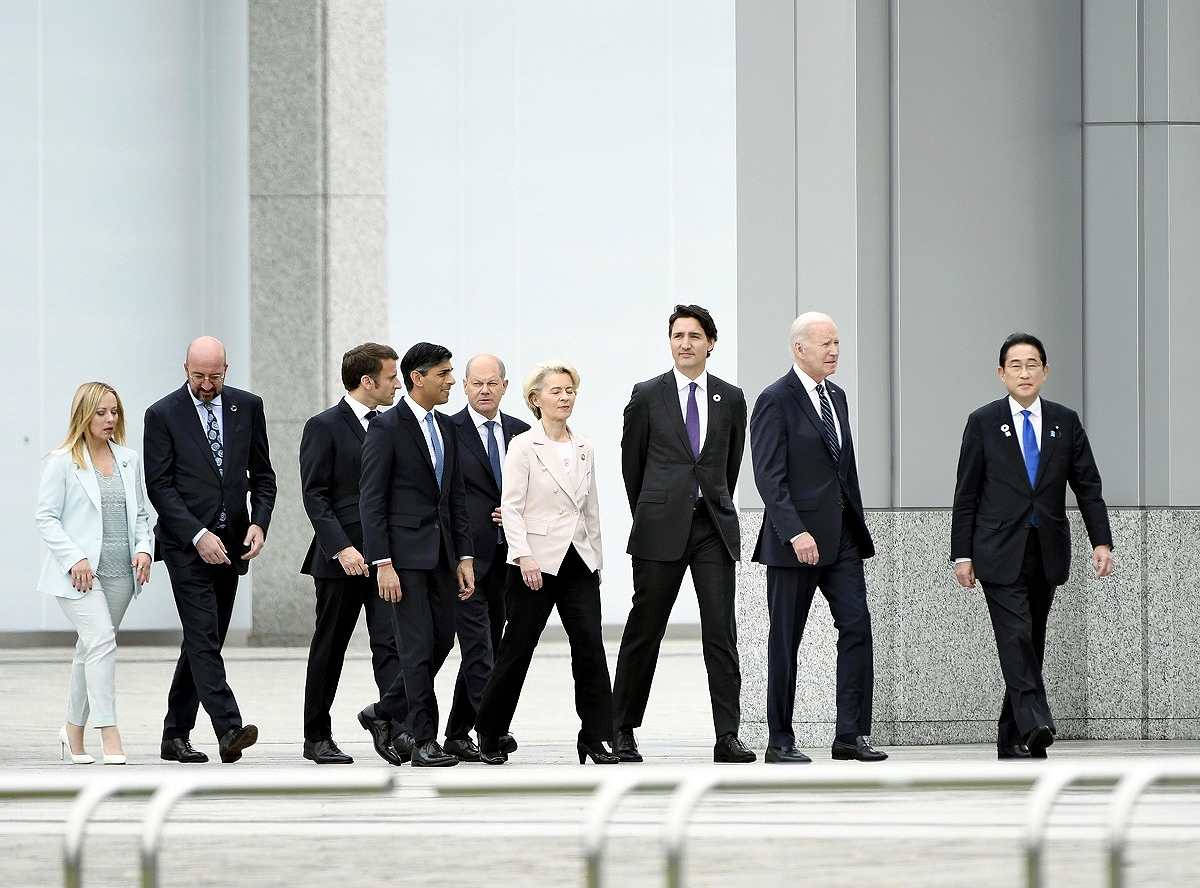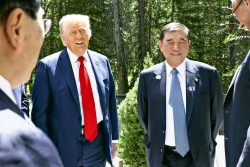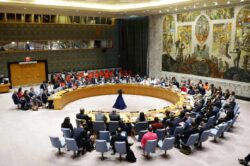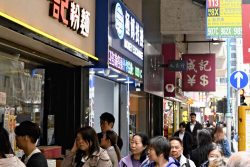
Prime Minister Fumio Kishida leads other G7 leaders from the Hiroshima Peace Memorial Museum to a wreath-laying ceremony on May 19.
20:00 JST, July 31, 2023
Just days before the 78th anniversary of the atomic bombings of Hiroshima and Nagasaki, a survey of survivors known as hibakusha has been released. The results showed that 63% of them could appreciate the visit by G7 leaders to the Hiroshima Peace Memorial Museum in May during their summit.
The survey of 100 atomic bomb survivors was conducted by The Yomiuri Shimbun in cooperation with the Center for Peace at Hiroshima University and Hiroshima Television Corp. The interviews were conducted in person or by telephone from June to July.
The United States, which dropped an atomic bomb on Hiroshima on Aug. 6, 1945, and another one on Nagasaki on Aug. 9, 1945, is a member of the G7, as are fellow nuclear powers France and the United Kingdom. The other members are Canada, Germany, Italy, Japan, and the European Union.
The G7 leaders spent about 40 minutes at the museum looking at the exhibits. They also heard 85-year-old atomic bomb survivor Keiko Ogura talk about her experience. The leaders signed the museum’s guestbook to express thoughts on peace, with some calling for the elimination of nuclear weapons around the world.
Many of the 63 hibakusha who could appreciate the visit said it was a good opportunity for these global leaders to learn about the reality of an atomic bombing.
“The road to the abolishment of nuclear weapons remains long,” said Kiyomi Kono, a 92-year-old hibakusha living in Hiroshima. “The experiences of the leaders during the summit make for an important step forward though.”
There were 23 atomic bomb survivors who said they couldn’t appreciate the visit, while 14 said they didn’t feel either way.
An overwhelming 97% of those surveyed said the Japanese government should have publicized the details of the visit. The government is believed to have withheld the details out of consideration for public opinion in the United States, the only country to have used atomic bombs.
“This is regrettable because the abolishment of nuclear weapons will be achieved only by conveying what the leaders saw and how they thought and felt about the reality of an atomic bombing,” said Toshiyuki Mimaki, an 81-year-old hibakusha in Hiroshima Prefecture.
Top Articles in Politics
-

LDP Wins Historic Landslide Victory
-

LDP Wins Landslide Victory, Secures Single-party Majority; Ruling Coalition with JIP Poised to Secure Over 300 seats (UPDATE 1)
-

Japan Tourism Agency Calls for Strengthening Measures Against Overtourism
-

CRA Leadership Election Will Center on Party Rebuilding; Lower House Defeat Leaves Divisions among Former CDPJ, Komeito Members
-

Voters Using AI to Choose Candidates in Japan’s Upcoming General Election; ChatGPT, Other AI Services Found Providing Incorrect Information
JN ACCESS RANKING
-

Japan Institute to Use Domestic Commercial Optical Lattice Clock to Set Japan Standard Time
-

Israeli Ambassador to Japan Speaks about Japan’s Role in the Reconstruction of Gaza
-

Man Infected with Measles May Have Come in Contact with Many People in Tokyo, Went to Store, Restaurant Around When Symptoms Emerged
-

China Eyes Rare Earth Foothold in Malaysia to Maintain Dominance, Counter Japan, U.S.
-

Prudential Life Insurance Plans to Fully Compensate for Damages Caused by Fraudulent Actions Without Waiting for Third-Party Committee Review























